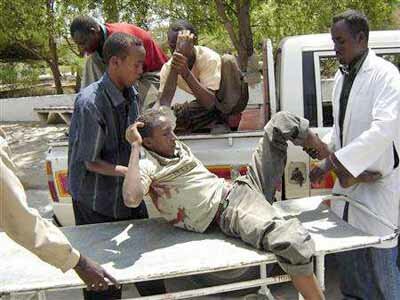Situation in Somalia still deteriorating fast

Governments worldwide urged not to forcibly return people to Somalia where lives are at risk.
GENEVA – Amid a fast deteriorating situation in Somalia, UNHCR on Friday issued an urgent appeal to governments everywhere not to forcibly return people to that country.
Speaking at a press briefing in Geneva, UNHCR’s chief spokesperson, Melissa Fleming, said inconsistencies in the way that countries are dealing with people fleeing Somalia were allowing returns to happen and putting lives at risk.
“Today, we are appealing to all states to uphold their international obligations with regard to non-refoulement,” she said. “In recent months there have been incidents of returns . . . These have included a further reported deportation, of over 100 Somalis from Saudi Arabia to Mogadishu in mid May.”
UNHCR has issued repeated warnings about the situation in Somalia over recent months, and on May 11 issued guidelines aimed at strengthening international protection for people from the Horn of Africa country. Among the recommendations in these guidelines is for countries facing large numbers of arrivals to grant protection to people from southern and central Somalia on a group basis, and to extend complementary forms of international protection where refugee status is not granted.
Fleming reiterated UNHCR’s concerns and said “a consistent international approach was needed to ensure that the international protection needs of refugees from Somalia are met.”
The situation in Somalia has been worsening for some time, with food aid having been suspended in January by the World Food Programme and fighting being reported almost daily in the capital, Mogadishu.
By UNHCR’s estimate some 1.4 million people are displaced internally and more than 570,000 are refugees in neighbouring and other countries. People being returned risk being sent into a war zone and can therefore be in considerable danger.
The principle of no forced return, or non-refoulement, is a central element of international refugee law. UNHCR believes no refugee or asylum-seeker in any country should ever be refouled.
A Worsening Humanitarian Crisis
Almost two decades after the overthrow of President Siad Barre, Somalia remains a failed state with little prospect of a meaningful peace on the horizon. Sporadic outbursts of violence have caused hundreds of thousands of people to leave their homes and seek shelter in other parts of the country or flee to neighbouring or nearby states, including Ethiopia, Kenya, Tanzania and Uganda. In recent years tens of thousands have risked their lives by making the dangerous Gulf of Aden crossing from northern Somalia to Yemen. Hundreds die each year during the voyage.
The UN refugee agency and other international humanitarian organizations find it virtually impossible to work in the south-central part of the country, including the capital, Mogadishu, because of the lawlessness and anarchy. They rely on local partners, but these are themselves coming under increasing pressure as they try to help the victims of one of the worst humanitarian crises in the world today.
Since Somalia began imploding in 1991, more than half-a-million people have fled overseas, putting enormous pressure on neighbouring countries, especially Kenya, Ethiopia and Yemen. A further 1.4 million people are internally displaced, most of them in the volatile south-central region.
Half of the population living in Somalia is in urgent need of humanitarian assistance, one in every five children is acutely malnourished and less than 100,000 of the country’s internally displaced children attend primary school.
The general insecurity, including regular outbreaks of fighting and the murder and abduction of humanitarian workers, has made it more and more difficult for relief agencies to access those in need. As a consequence, the vulnerable are not getting access to adequate water, food, health care, education and shelter.
UNHCR works to help displaced Somalis inside and outside the country. In asylum countries, UNHCR supports governments in providing international protection to the refugees and to meet their basic needs. Inside Somalia, UNHCR coordinates all protection activities and interventions to provide shelter and relief items.
—————–
Source:- middle-east-online.com
Comments
comments
 Calendar
Calendar




































